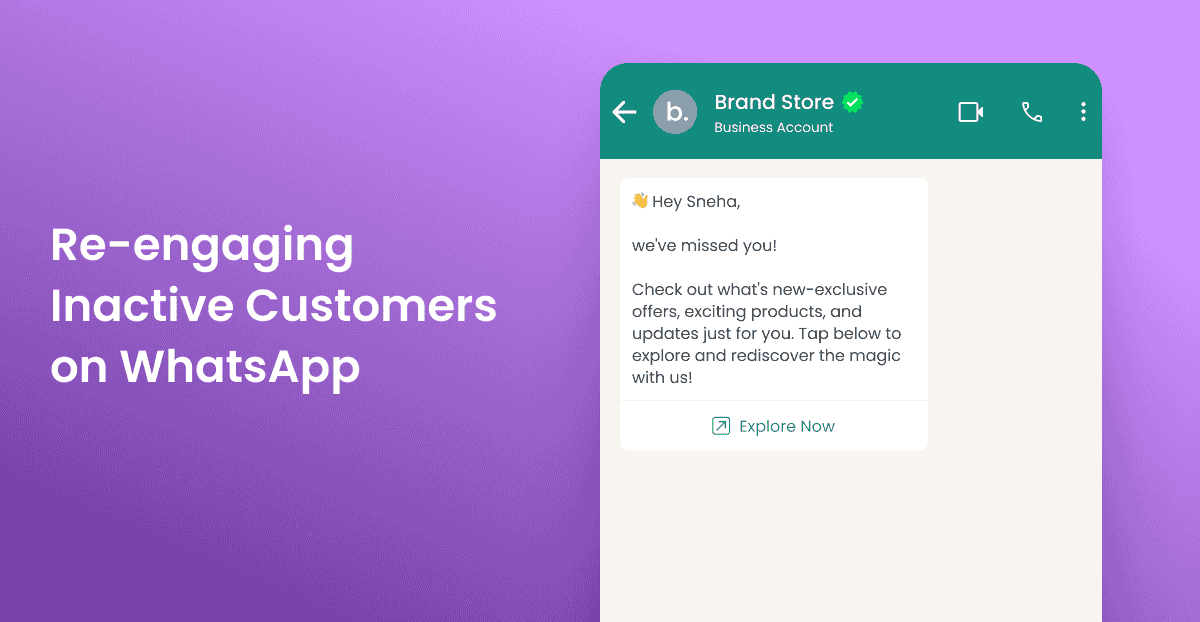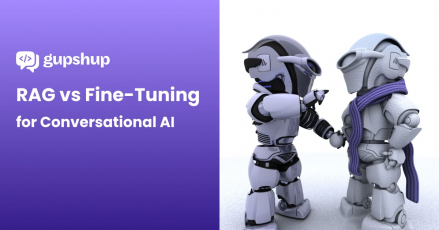Conversational Marketing for WhatsApp

For years, businesses relied on one-sided communication strategies, broadcasting messages to customers without truly engaging them.
Marketing campaigns were broad strokes, treating audiences as monolithic instead of dynamic individuals. But the game has changed. Conversational marketing, particularly through platforms like WhatsApp, has transformed the way businesses connect with their audiences. It puts the customer at the center of every interaction, ensuring their voice is heard and their needs are met.
With over 2.78 billion monthly active users globally and 83% of them checking the app daily, it has become the ultimate channel for WhatsApp marketing and real-time customer engagement. Businesses are increasingly using the WhatsApp Business API to integrate conversational AI into their strategies, enabling smarter, more interactive customer experiences.
Customers don’t just use WhatsApp to message friends and family; they’re discovering brands, engaging with businesses, and making purchases. This is why conversational marketing for WhatsApp has become a game-changer.
This article explores how you can harness the power of conversational marketing with WhatsApp to create engaging, customer-centric experiences. We’ll also highlight Gupshup’s innovative solutions, which help integrate WhatsApp Business API and conversational AI to make every interaction impactful, turning conversations into lasting connections.
Understanding Conversational Marketing
What is conversational marketing?
Conversational marketing is a newer approach to engaging customers that focuses on creating natural, real-time conversations to guide them through their journey. Unlike traditional methods that often push information at customers, this approach is all about meeting customers where they are and making interactions personalized.
At its core, conversational marketing involves using tools like chatbots, conversational AI, and platforms like WhatsApp Business API to simplify customer interactions. Instead of forcing people through long processes, it provides the answers, support, or guidance they need in an intuitive, easy-to-use format.
Key components of conversational marketing
1. Instant access to support
With conversational marketing, businesses can provide immediate responses to customer inquiries, eliminating the frustration of waiting. For instance, messages sent via the WhatsApp Business API boast a 99% open rate, far surpassing the average email open rate of just over 21%.
2. Personalized interactions
By utilizing customer data, conversational marketing ensures that each interaction is tailored to the individual’s needs. Notably, 91% of consumers are more likely to shop with brands that provide relevant offers and recommendations.
3. Convenience in every step
This strategy streamlines the customer journey by keeping all interactions within a single conversation, reducing the need to switch between different communication channels. Such convenience can lead to a 20% increase in conversion rates when live chat functionality is added to a website.
4. Two-way conversations
Conversational marketing fosters genuine dialogue between businesses and customers, building trust and encouraging loyalty. Approximately 68% of consumers prefer chatbots for quick communication with businesses, highlighting the demand for interactive engagement.
5. Smart integration with tools
To ensure consistency and efficiency, businesses integrate messaging platforms with CRM tools. This integration supports the growing trend of conversational commerce, with the global market projected to reach $4,915,1 billion in 2028.
As customer expectations evolve, conversational marketing becomes essential to offering the instant, personalized experiences that modern consumers demand.
Using WhatsApp for Conversational Marketing
Why WhatsApp is the perfect platform for conversational marketing
WhatsApp Business enables businesses to engage with customers in a more personalized and efficient way. With platforms like Gupshup to integrate WhatsApp Business API, businesses can scale their interactions while maintaining a human touch. This combination makes WhatsApp a vital tool for conversational marketing.
Features that make WhatsApp ideal for conversational marketing
1. Business profiles: Build trust with a professional digital presence.
- Create a profile with your logo, description, contact information, and location to give customers a clear understanding of your business.
- A business profile forms the foundation of WhatsApp marketing, presenting your brand in a professional light.
2. Automated messages: Respond instantly with minimal effort.
- Use features like greetings, away messages, and quick replies to handle common inquiries automatically.
- Platforms like Gupshup enhance these capabilities by enabling advanced automation and conversational AI solutions, ensuring intelligent customer interactions.
3. Labels for organization: Streamline your customer interactions.
- Organize chats with labels such as “new customer,” “pending orders,” or “VIP client” for better management.
- This is particularly effective when integrated with tools like Gupshup, which supports efficient chat categorization and workflow management to boost your conversational marketing for WhatsApp strategy.
4. Catalogs and products: Make shopping easy and interactive.
- Showcase your products or services directly in WhatsApp with detailed descriptions and images.
5. Messaging insights: Refine your strategy with data.
- Track key metrics like message delivery, reads, and responses using the WhatsApp Business API.

This success demonstrates how Gupshup’s Conversation Cloud simplifies integration with WhatsApp, enabling businesses to run engaging, gamified campaigns that boost interaction and retention.
Implementing Conversational Marketing on WhatsApp

Here’s how to set up and optimize your WhatsApp Business account, drive engagement with broadcasts, and craft interactive messages that encourage customer interaction and feedback.
How to set up and optimize a WhatsApp Business account
To begin, businesses need to establish a WhatsApp Business account. This platform is designed specifically for professional use and offers advanced features tailored for engagement.
Steps to set up your account:
1. Download and install the app
- WhatsApp Business is available for both Android and iOS devices. Download it from your app store.
2. Register your business
- Use a dedicated phone number to register your account.
- Verify the number with a code sent via SMS or call.
3. Create and optimize your business profile
- Business name: Clearly state your business name for brand recognition.
- Profile picture: Use a professional logo or image representing your brand.
- Business details: Provide essential information such as address, email, website, and business description.
- Operating hours: Specify your working hours to set customer expectations.
Driving engagement with WhatsApp broadcasts –
1. Understand broadcast lists
- Broadcasts let you send messages to multiple contacts simultaneously without creating a group chat.
- Messages appear as private chats for recipients, maintaining confidentiality.
2. Set up broadcast lists
- Go to the chat screen, tap ‘More options’ > ‘New broadcast,’ and select up to 256 contacts.
- Personalize messages to make them relevant to each recipient.
3. Best practices for broadcasts
- Provide value: Share updates, promotions, or other content that adds value for your audience.
- Timing: Send messages during peak engagement hours for better open rates.
- Ensure compliance: Always have customer consent to comply with privacy regulations.
The importance of interactive messages
1. Types of Interactive Messages
- Quick replies: Predefined buttons for users to respond with a single tap.
- List messages: Menu-style options that simplify navigation for customers.
2. How to craft interactive messages
- Clear call-to-action (CTA): Use actionable prompts like “Shop now” or “Contact us.”
- Visual appeal: Include images or videos to make messages more engaging.
- Personalization: Address recipients by name and tailor messages to their interests.
3. Benefits of interactive messages
-
- Increased engagement: Interactive elements make it easier for customers to participate.
- Enhanced user experience: Simplifies the process for customers to interact with your business.
- Higher conversions: Makes customer journeys smoother, increasing the likelihood of sales.
Building Personalized Customer Journeys with WhatsApp
Building personalized customer journeys involves tailoring each interaction to meet individual customer needs and preferences, enhancing engagement, satisfaction, and loyalty.
Here’s how to create these customized experiences:
1. Understand your customers
- Collect data: Gather insights from sources like website analytics, social media interactions, customer feedback, and CRM systems to build detailed profiles.
- Segment audiences: Group customers based on behaviors, preferences, and demographics to create targeted experiences.
2. Map the customer journey
- Identify touchpoints: Pinpoint all interactions customers have with your brand across different channels.
- Create journey maps: Use visual tools to outline customer interactions, highlighting opportunities for personalization and improvement.
3. Leverage technology
- Use AI and machine learning: Employ advanced tools to analyze customer data and predict their needs for dynamic personalization.
- Implement marketing automation: Automate personalized communications based on customer behaviors and preferences.
4. Create personalized content
- Develop customized messaging: Tailor content to address specific customer interests and needs at different stages of the journey.
- Incorporate interactive elements: Engage customers actively with quizzes, personalized recommendations, or other interactive features.
5. Ensure consistency across channels
- Adopt an omnichannel approach: Provide seamless experiences across platforms such as email, social media, and in-store interactions.
- Adapt in real-time: Adjust customer interactions based on current behaviors to maintain relevance and engagement.
6. Measure and optimize
- Track analytics: Monitor key performance indicators (KPIs) to evaluate the effectiveness of your personalization strategies.
- Refine strategies: Continuously improve personalized journeys using insights from data and feedback.
By implementing these strategies, businesses can create personalized customer journeys that foster deeper connections, enhance satisfaction, and drive long-term loyalty.
Re-engaging Inactive Customers on WhatsApp
How to bring back disengaged customers with conversational marketing
Re-engaging inactive customers is crucial for businesses aiming to rekindle interest and drive conversions. Gupshup offers effective strategies to reconnect with disengaged customers through personalized messages and exclusive promotions.
1. Personalized re-engagement offers
Sending tailored offers to inactive customers can reignite their interest. For instance, automated messages featuring special discounts or promotions can prompt customers to revisit and complete purchases.
2. Abandoned cart reminders
Automated reminders about abandoned carts can encourage customers to finalize their purchases. Combining these reminders with incentives, such as free shipping or limited-time discounts, can effectively boost conversion rates.
3. Utilizing click-to-WhatsApp ads
Click-to-WhatsApp ads facilitate direct communication with customers, enabling businesses to send personalized messages that re-engage users who have previously interacted with the brand. This approach enhances customer retention and encourages repeat business.
4. Implementing conversational AI
Leveraging conversational AI allows businesses to automate interactions with inactive customers, providing personalized recommendations and support that can rekindle interest and drive engagement.
For more insights on re-engaging customers, visit Gupshup’s comprehensive guide on conversational AI.
Best practices for Conversational Marketing on WhatsApp
Create meaningful, customer-centric interactions by personalizing messages, leveraging automation, and maintaining a natural conversational tone.
1. Obtain explicit consent
- User permission: Always ensure customers opt-in to receive messages from your business via WhatsApp marketing. This not only complies with privacy regulations but also builds trust, a crucial component of conversational marketing for WhatsApp.
2. Personalize communications
- Tailored messages: Use customer data to craft personalized interactions. For example, employing conversational AI can help create dynamic and relevant responses that align with customer preferences, enhancing conversational marketing effectiveness.
3. Maintain message relevance and frequency
- Content value: Share updates, offers, or tips that customers find genuinely useful. With WhatsApp Business API, you can automate relevant messages that add value to their experience.
- Avoid over-messaging: Limit the number of messages to maintain customer interest and avoid opt-outs. Effective WhatsApp marketing strategies balance engagement and restraint.
4. Utilize interactive features
- Quick replies and buttons: Use interactive elements supported by WhatsApp Business API to simplify navigation. For example, quick replies can enable customers to select options with a single tap, fostering seamless conversational marketing.
5. Implement clear calls to action (CTAs)
- Guiding prompts: Use direct and compelling CTAs like “Shop Now,” “Get Discount,” or “Track Order” to drive customer actions. CTAs are fundamental in conversational marketing with WhatsApp to ensure meaningful engagement.
6. Leverage multimedia content
- Engaging formats: Enhance your messaging with images, videos, and GIFs. Multimedia not only captures attention but also supports visually engaging conversational marketing for WhatsApp campaigns.
7. Ensure timely responses
- Prompt engagement: Quick replies demonstrate professionalism and build trust. Using conversational AI, businesses can automate responses and maintain real-time communication, a hallmark of effective WhatsApp marketing.
8. Monitor and analyze performance
- Track metrics: Leverage insights from WhatsApp Business API to evaluate engagement rates, response times, and customer satisfaction.
- Optimize strategies: Refine your conversational marketing campaigns using data analytics to ensure continued relevance and effectiveness.
Choosing the right conversational marketing platform
Why Gupshup is the ideal choice for conversational marketing with WhatsApp
Gupshup offers tools to automate customer engagement across multiple channels, including WhatsApp. It helps businesses streamline interactions, improve efficiency, and scale communication with its advanced features.
Key features of Gupshup
-
AI-powered chatbots
-
-
- Automates customer interactions with chatbots capable of understanding and responding in real-time.
- Supports pre-trained models and can adapt to various data inputs for accurate responses.
-
-
Multi-channel messaging
-
-
- Engages customers across platforms like WhatsApp, Facebook Messenger, Instagram, and more.
- Provides consistent communication across 30+ supported channels.
-
-
Seamless integrations
-
- Connects with CRM systems, e-commerce tools, and helpdesk platforms.
- Automates workflows for smooth operation and customer management.
Benefits of Gupshup
- Improved engagement: Provides personalized and quick responses to customer queries.
- Operational efficiency: Reduces repetitive tasks and enhances team productivity.
- Scalability: Handles high volumes of interactions, serving over 45,000 brands globally.
Gupshup is a reliable platform for businesses looking to automate customer engagement with tools like chatbots, multi-channel messaging, and integrations.
Conclusion
Conversational marketing with WhatsApp has revolutionized how businesses interact with customers, providing a personalized, real-time, and efficient communication channel. By leveraging tools like the WhatsApp Business API, conversational AI, and innovative platforms such as Gupshup, companies can enhance customer experiences, boost engagement, and drive conversions. From streamlining customer journeys to re-engaging inactive users and offering in-chat payments, the potential of WhatsApp marketing is immense.
With its AI-powered chatbots, multi-channel messaging capabilities, and seamless integrations, Gupshup is the ultimate solution for businesses aiming to deliver impactful, customer-centric interactions. Whether you’re looking to automate customer support, improve operational efficiency, or create engaging campaigns, Gupshup provides the tools you need to succeed.
Ready to transform your customer engagement with conversational marketing on WhatsApp? Start your journey today with Gupshup!
FAQ’s
1. What is a conversational marketing example?
Gupshup enabled MTV & MTV Beats to run interactive campaigns on WhatsApp. By integrating QR codes during TV shows, viewers were redirected to WhatsApp to participate in contests, submit selfies, and send messages. This conversational approach led to over 1.8 million messages, showcasing deep engagement and successful conversational marketing.
2. How to do marketing on WhatsApp?
Use WhatsApp Business to create a professional profile, obtain customer consent, and send personalized messages, promotions, or updates to engage your audience.
3. Is it legal to send marketing messages on WhatsApp?
Yes, with user consent. Businesses must comply with privacy regulations and WhatsApp’s policies, ensuring messages are sent only to users who have opted in.




